2012中考一轮复习精品课件(含2011中考真题)英语仁爱版七下(104张ppt)
文档属性
| 名称 | 2012中考一轮复习精品课件(含2011中考真题)英语仁爱版七下(104张ppt) | 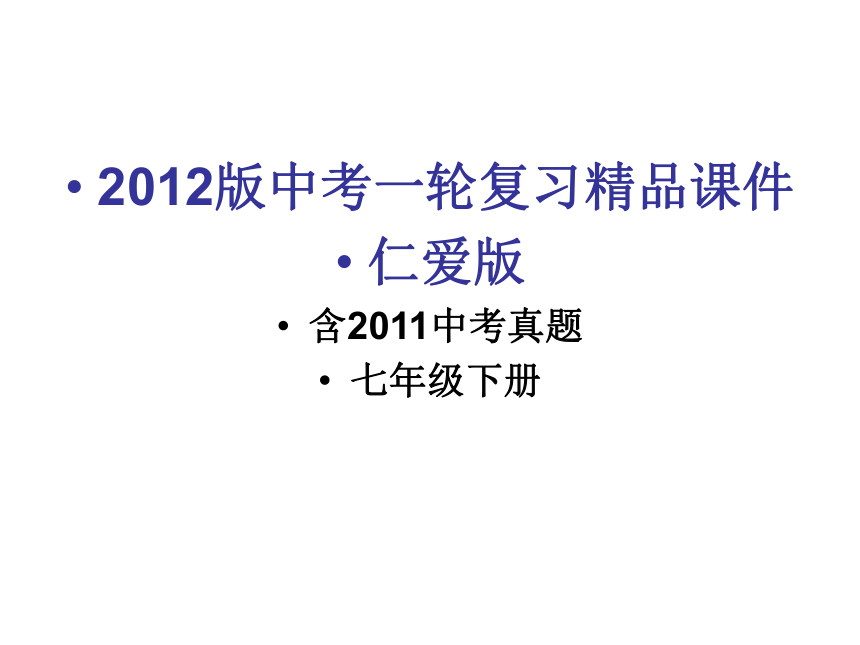 | |
| 格式 | rar | ||
| 文件大小 | 586.2KB | ||
| 资源类型 | 教案 | ||
| 版本资源 | 通用版 | ||
| 科目 | 英语 | ||
| 更新时间 | 2012-01-12 10:41:39 | ||
图片预览

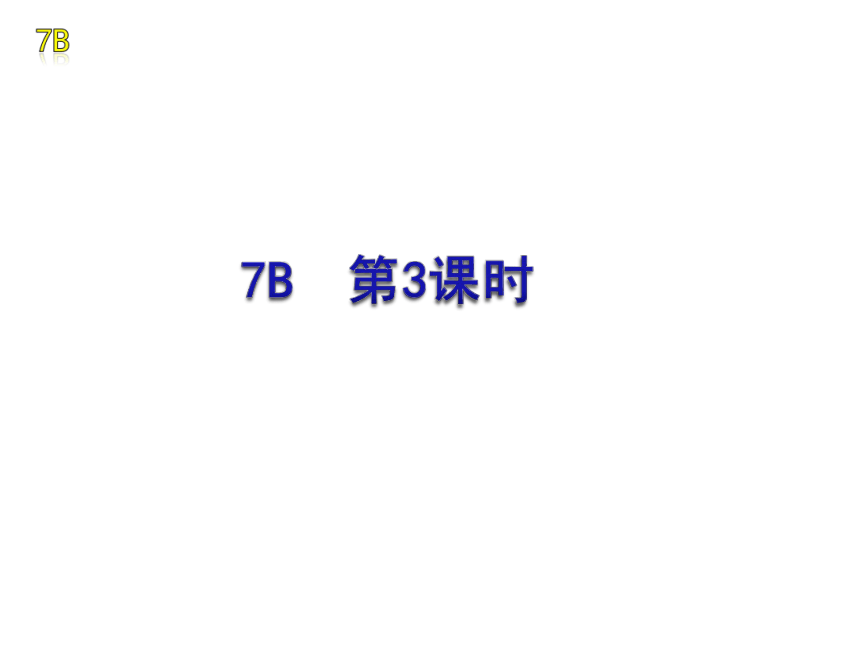
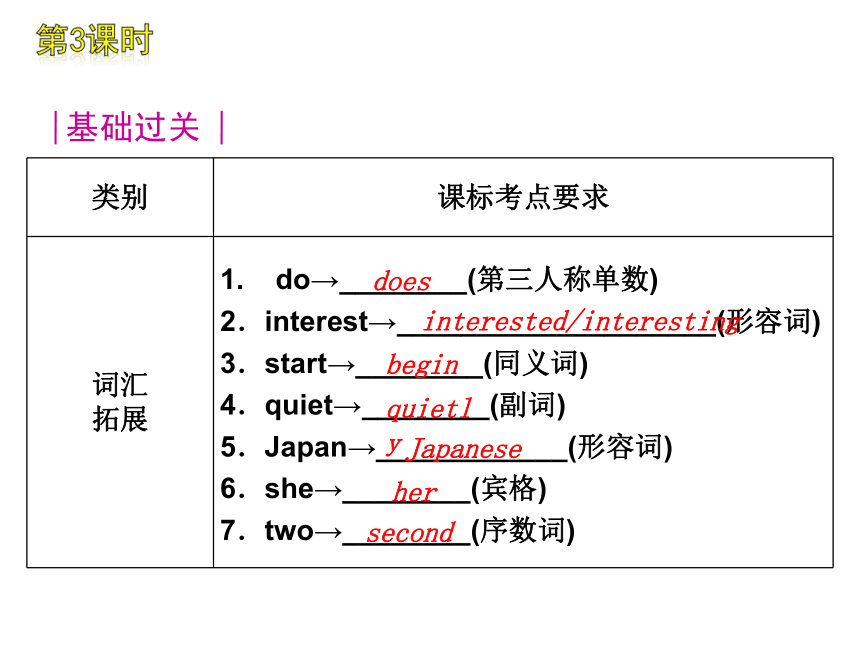
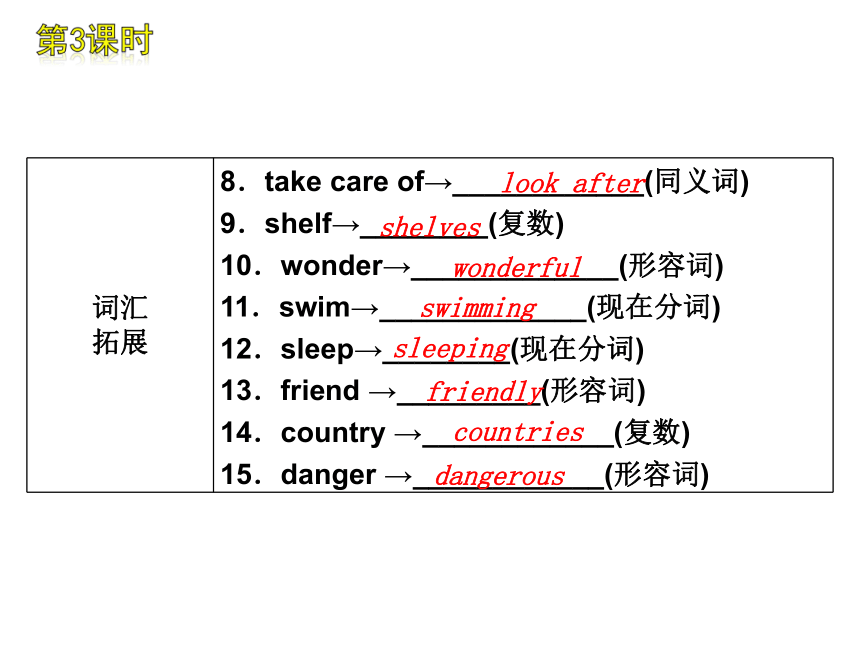
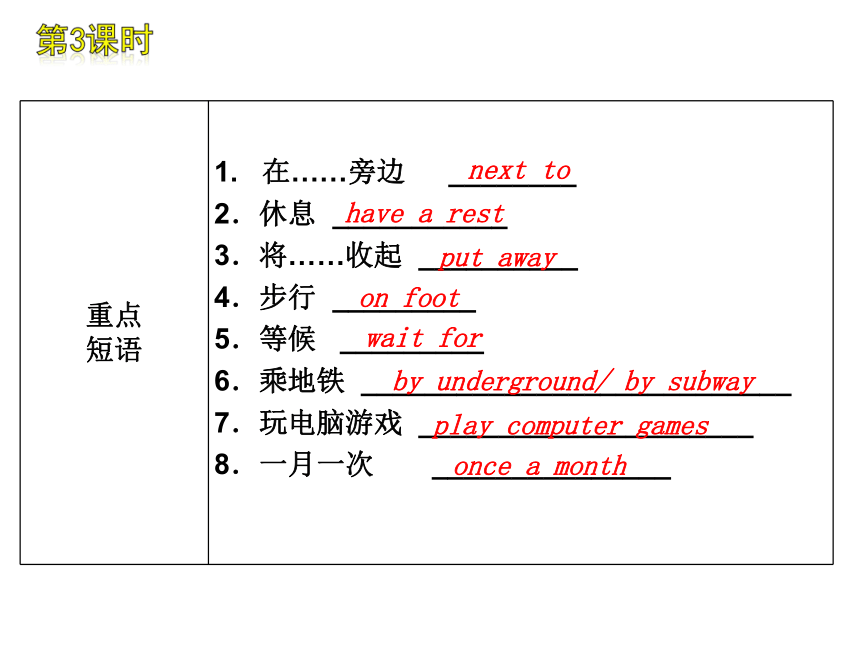
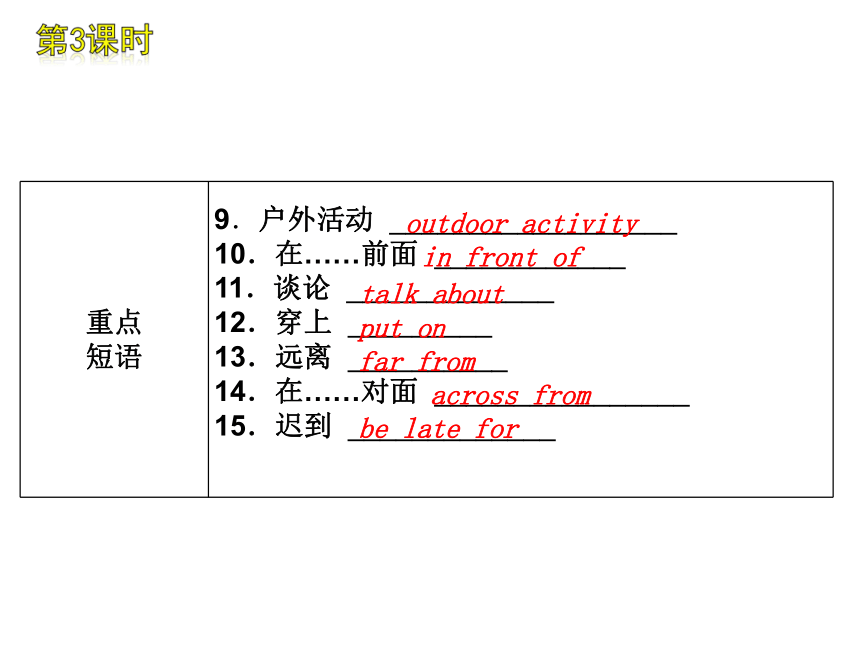
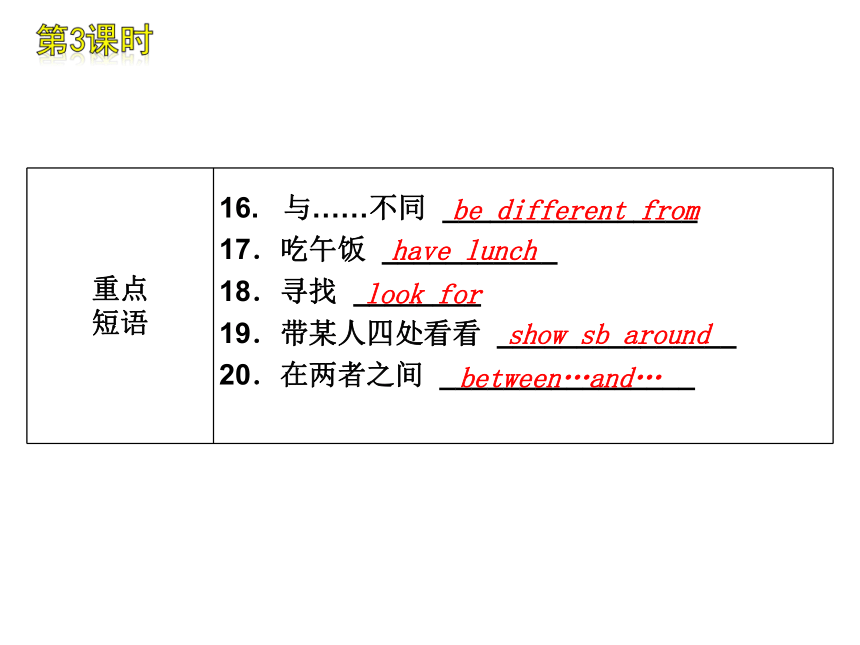
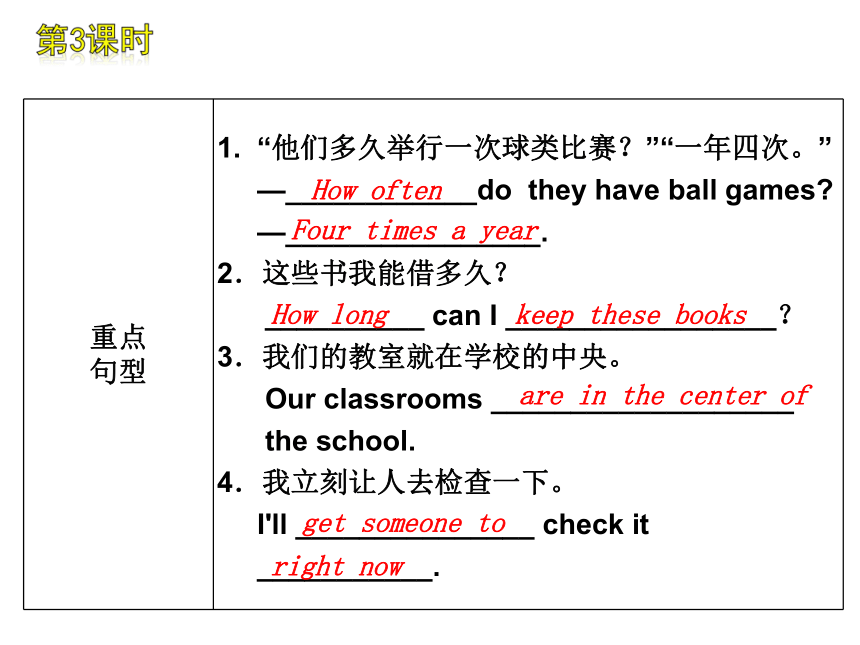
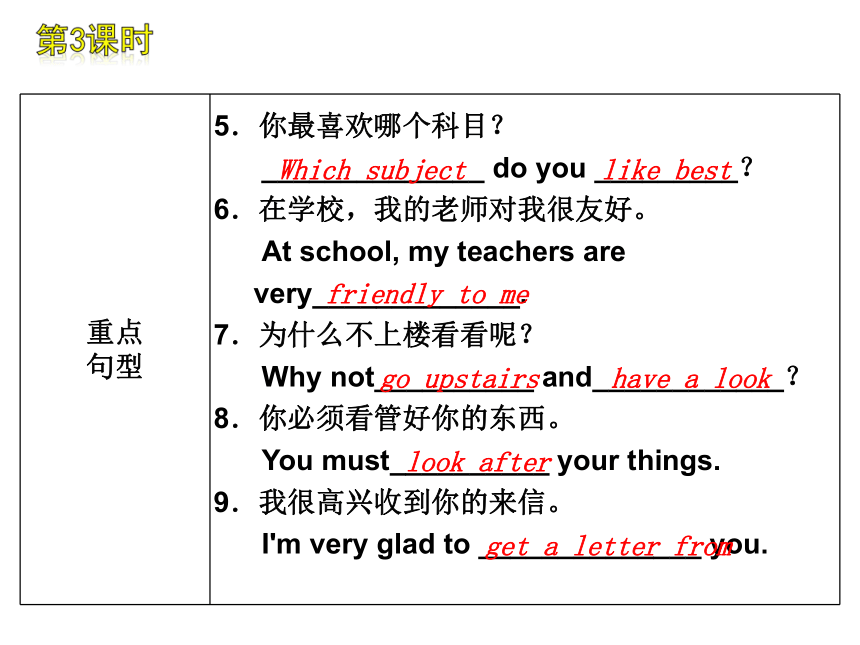
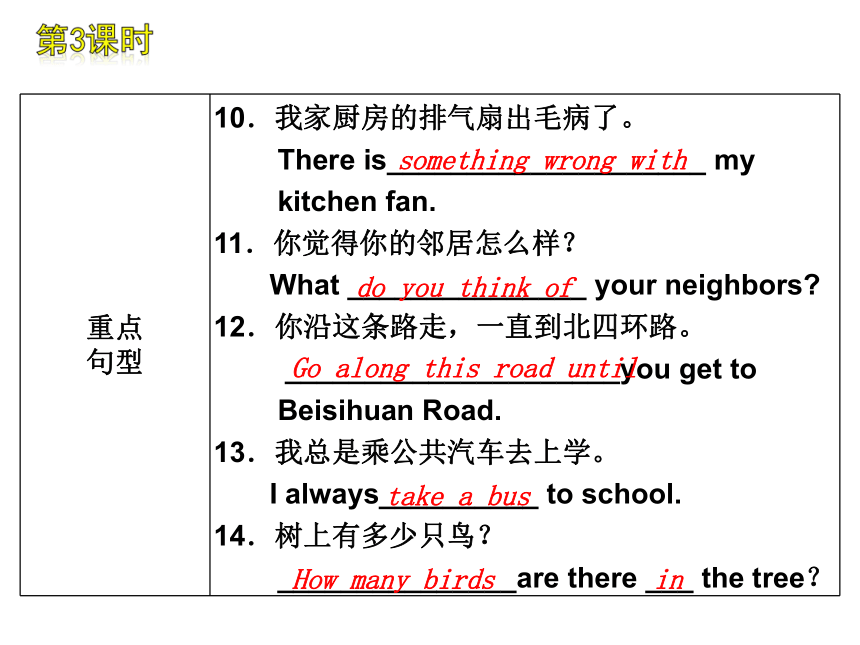
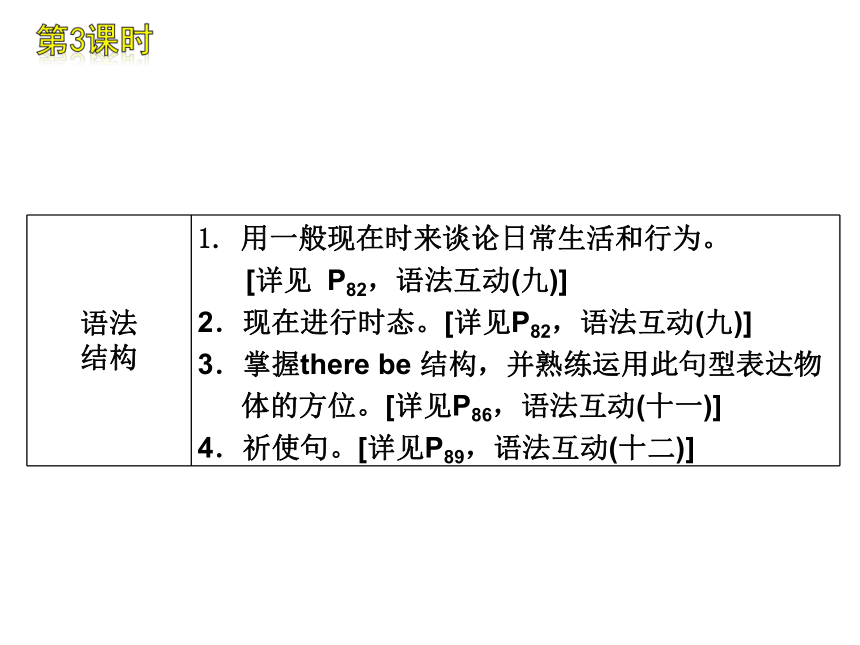
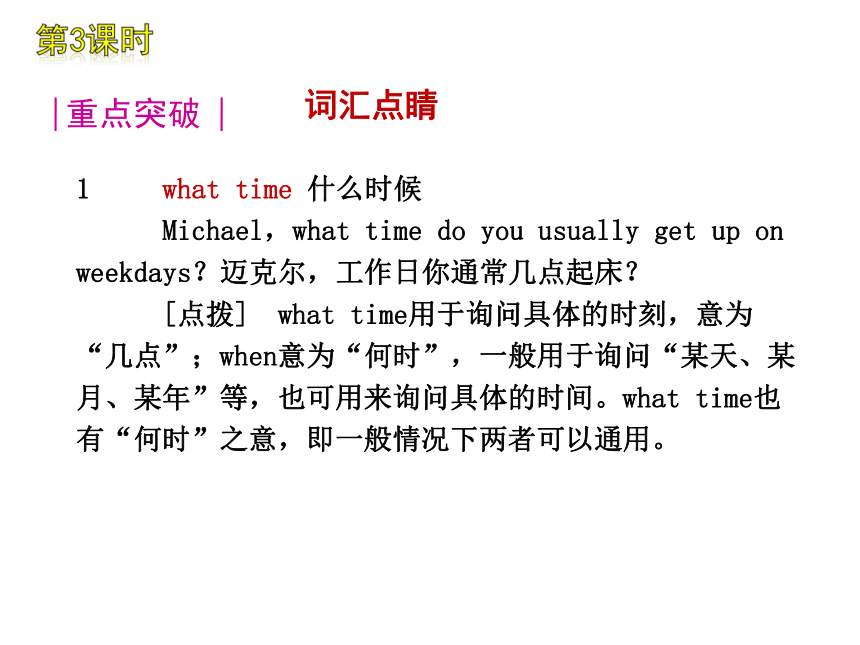
文档简介
(共104张PPT)
2012版中考一轮复习精品课件
仁爱版
含2011中考真题
七年级下册
·福建省专用
基础过关
·福建省专用
类别 课标考点要求
词汇
拓展 1. do→________(第三人称单数)
2.interest→____________________(形容词)
3.start→________(同义词)
4.quiet→________(副词)
5.Japan→____________(形容词)
6.she→________(宾格)
7.two→________(序数词)
does
interested/interesting
begin
quietly
Japanese
her
second
·福建省专用
词汇
拓展 8.take care of→____________(同义词)
9.shelf→________(复数)
10.wonder→_____________(形容词)
11.swim→_____________(现在分词)
12.sleep→________(现在分词)
13.friend →_________(形容词)
14.country →____________(复数)
15.danger →____________(形容词)
look after
shelves
wonderful
swimming
sleeping
friendly
countries
dangerous
·福建省专用
重点
短语 1. 在……旁边 ________
2.休息 ___________
3.将……收起 __________
4.步行 _________
5.等候 _________
6.乘地铁 ___________________________
7.玩电脑游戏 _____________________
8.一月一次 _______________
next to
have a rest
put away
on foot
wait for
by underground/ by subway
play computer games
once a month
·福建省专用
重点
短语 9.户外活动 __________________
10.在……前面 ____________
11.谈论 _____________
12.穿上 _________
13.远离 __________
14.在……对面 ________________
15.迟到 _____________
outdoor activity
in front of
talk about
put on
far from
across from
be late for
·福建省专用
重点
短语 16. 与……不同 ________________
17.吃午饭 ___________
18.寻找 ________
19.带某人四处看看 _______________
20.在两者之间 ________________
be different from
have lunch
look for
show sb around
between…and…
·福建省专用
重点
句型 1. “他们多久举行一次球类比赛?”“一年四次。”
—____________do they have ball games
—________________.
2.这些书我能借多久?
__________ can I _________________?
3.我们的教室就在学校的中央。
Our classrooms ___________________
the school.
4.我立刻让人去检查一下。
I'll _______________ check it
___________.
How often
Four times a year
How long
keep these books
are in the center of
get someone to
right now
·福建省专用
重点
句型 5.你最喜欢哪个科目?
______________ do you _________?
6.在学校,我的老师对我很友好。
At school, my teachers are
very_____________.
7.为什么不上楼看看呢?
Why not__________ and____________?
8.你必须看管好你的东西。
You must__________ your things.
9.我很高兴收到你的来信。
I'm very glad to ______________ you.
Which subject
like best
friendly to me
go upstairs
have a look
look after
get a letter from
·福建省专用
重点
句型 10.我家厨房的排气扇出毛病了。
There is____________________ my
kitchen fan.
11.你觉得你的邻居怎么样?
What _______________ your neighbors
12.你沿这条路走,一直到北四环路。
_____________________you get to
Beisihuan Road.
13.我总是乘公共汽车去上学。
I always__________ to school.
14.树上有多少只鸟?
_______________are there ___ the tree?
something wrong with
do you think of
Go along this road until
take a bus
How many birds
in
·福建省专用
语法
结构 用一般现在时来谈论日常生活和行为。
[详见 P82,语法互动(九)]
2.现在进行时态。[详见P82,语法互动(九)]
3.掌握there be 结构,并熟练运用此句型表达物
体的方位。[详见P86,语法互动(十一)]
4.祈使句。[详见P89,语法互动(十二)]
·福建省专用
词汇点睛
1 what time 什么时候
Michael,what time do you usually get up on weekdays?迈克尔,工作日你通常几点起床?
[点拨] what time用于询问具体的时刻,意为“几点”;when意为“何时”,一般用于询问“某天、某月、某年”等,也可用来询问具体的时间。what time也有“何时”之意,即一般情况下两者可以通用。
重点突破
·福建省专用
2 seldom adv. 很少; 不经常;偶尔
I seldom walk to school.
我很少步行去上学。
[点拨] 该词本身表否定,不和not连用。seldom是表示频率的词,在句中位于行为动词之前,be动词、助动词、情态动词之后。
[拓展] 表示频率的副词还有never, sometimes, often, usually, always。 它们之间的关系可用下图表示:
never, seldom, sometimes, often, usually, always
0%―→100%
·福建省专用
活学活用
( )The woman is very busy so she _____ watches TV.
A.often B.always
C.seldom D.almost
C
考查频率副词的用法。句意为:这个妇女很忙,以至于她很少看电视。often表示“经常”;always表示“总是”;seldom表示“很少”;almost表示“几乎”。故选C。
·福建省专用
3 like v. 喜欢
He likes playing soccer best.
他最喜欢踢足球。
[点拨] like可接动词 ing形式、动词不定式这两种形式作宾语,但意思稍有差别。like doing sth意为“喜欢做某事”,表示一种爱好;like to do sth也意为“喜欢做某事”,强调某一动作。
·福建省专用
活学活用
根据汉语意思完成句子
Mary _____________. She often goes to the library.
玛丽喜欢读书,她经常去图书馆。
likes reading
·福建省专用
4 between prep. 在……之间
There is a soccer game between Class One and Class Two on the playground at 5:00 this afternoon.
下午五点钟,一班和二班将会在操场上进行一场足球赛。
[点拨] between表示在两者之间,常与and连用,意为“在……和……之间”。表示在三者或三者以上之间要用among。
·福建省专用
活学活用
1.单项填空
( ) [ 2011·宜宾]John is standing ________ Gina and Jim.
A.at B.during C.between D.in
2.根据汉语意思完成句子
He found it ________ a pile of old books.
他是在一堆旧书中找到它的。
C
among
·福建省专用
5 interesting adj. 有趣的
Yes, it's interesting.是的,很有趣。
[拓展] interested adj. 感兴趣的
interest n. 兴趣v.使……感兴趣
interested 以人作主语,be interested in sth,意为“对……感兴趣的”; interesting常用物作主语或修饰物。
·福建省专用
活学活用
根据汉语意思完成句子
(1)My sister ______________English.
我妹妹对英语感兴趣。
(2)This is an ____________book.
这是一本有趣的书。
(3)This book _________me.
这本书使我感兴趣。
is interested in
interesting
interests
·福建省专用
6 else adv. 别的;其他的
What else 还有其他什么吗?
[点拨] 常放在特殊疑问词或不定代词后,其后不再接名词。
[拓展] other是形容词,意为“其他的; 另外的”,在句中一般作定语,修饰后面的名词。
·福建省专用
活学活用
根据汉语意思完成句子
(1)What ________ animals do you like?
你还喜欢别的什么动物?
(2)What ________ things can I do
=What ______ can I do
我还能做别的什么事情?
other
other
else
·福建省专用
7 borrow v. 借
[点拨] 对于主语来说,borrow意为“借入”,常与介词from搭配构成“borrow sth from sb”结构,意为“从某人那里借来某物”。
[拓展] lend对于主语来说,意为“借出”,常与介词to搭配,构成“lend sth to sb”结构,意为“把某物借给某人”,或直接用“lend sb sth”表示。
·福建省专用
活学活用
( ) [ 2011·郴州] She likes reading. She usually________
some books from the library.
A.buys B.lends C.borrows
C
·福建省专用
8 close adj.靠近的;亲密的 v.关
Many shops and restaurants are close to my home.
许多商店和饭店紧挨着我家。
[点拨] (1)作形容词时,读作/kl s/,常与介词to搭配,构成be close to sb/sth 结构,意为“接近某人/物”。
She is my close friend. 她是我的密友。
Our house is close to the park. 我们的房子离公园很近。
·福建省专用
(2)作动词时,读/kl z/,与open“打开”意思相反。
Close the door, please.请关门。
[拓展] closed adj. 关着的(反义词为open adj. 开着的)
This shop has been closed for half a month.
这家店已经关门半个月了。
·福建省专用
9 every day 每一天
How many lessons do you have every day
你们每天上几节课?
[点拨] 该短语一般放在句末或句首作时间状语。
[拓展] 与该短语形式很相似的有everyday,该词是一个形容词,意为“每天的,日常的”,在句中作定语,修饰后面的名词,如:everyday English 日常英语; everyday life 日常生活。
·福建省专用
10 cross,across与through
[辨析] 这三个单词都表示“穿过”,但含义有些不同。
cross和across 表示从物体的表面穿过。cross是动词,across是介词。
He crossed the road carefully.=He walked across the road carefully.他小心地穿过马路。
through表示从物体的内部穿过,是介词。
The thief got into the room through the window.
这个小偷通过窗户进入房间。
·福建省专用
活学活用
选词填空(cross,across,through)
(1)The two boys walked ________the forest by
themselves.
(2)________the bridge,and you'll find the building.
(3)He ran ________ the square.
through
Cross
across
·福建省专用
11 change v. 改变;换;换乘n. 改变,变化;零钱
First, you need to take the No. 718 bus here, and then you can change to the No.108 streetcar at Anzhen Bridge.
首先,你需要乘坐718路车到这儿,然后你可以在安贞桥换乘108路有轨电车。
·福建省专用
活学活用
( )(1)The witch _______the prince________ a frog.
A.changed; into B.changed; as
C.let; into D.pull; down
句意为:巫婆把王子变成了青蛙。 change…into意为 “把……变成”。
A
·福建省专用
( )(2)Doctors say there is no ________ in the patient's
condition.
A.change B.changes
C.changing D.changed
句意为:医生说病人的情况没有变化。there is 谓语是单数,故用change。
A
·福建省专用
1 —How often do you go to the library
你多久去一次图书馆?
—Once a week. 一周一次。
[点拨] how often表示多久一次,对频率提问。对how often的回答,一般回答单位时间内的次数,如four times a week,或用频率副词often, always, seldom, every day等来回答。
—How often does she meet her friend
她多久见一次她的朋友?
—Seldom. 很少。
句型透视
·福建省专用
[拓展] how far是针对距离提问;how long是针对一段时间或长度提问;how soon是针对“in+一段时间”提问;how often是针对频率提问。
·福建省专用
活学活用
( )(1)—________ will you finish your homework
—In two hours.
A.How soon B.How far
C.How often D.How long
( )(2)—________ do you go to the movies
—Once a month.
A.How soon B.How far
C.How often D.How long
A
C
·福建省专用
( )(3)—_____ has your brother studied in New York
—For two years.
A.How far B.How old
C.How often D.How long
( )(4) [ 2011·襄阳]—Can you tell me____ it is from
home to school
—Sure. It's about three kilometers.
A.how much B.how long
C.how far D.how soon
D
C
考查宾语从句引导词的用法。由答语“大约两公里”可知应问“从家到学校有多远?”how much意为“多少,多少钱”; how long意为“多长,多长(时间)” ;how far意为“多远”;how soon意为“多久”。
·福建省专用
2 I often go to school by bike.
我经常骑自行车上学。
[点拨] “by+交通工具”表示“乘坐……”是一个介词短语,放在动词或动词短语之后。但步行应用on foot。
[拓展] go to+某地+by bike=ride(a bike)to…
go to…by bus=take a bus to…
go to…by plane=fly to …
go to…on foot=walk to…
·福建省专用
活学活用
1.单项填空
( )—________ do you usually go to work
—On foot.
A.What B.How
C.How often D.How long
2.根据汉语意思完成句子
She never goes home _______(乘公交车).
=She never _________________ .
B
by bus
takes a bus home
·福建省专用
3 There is a computer in my study.
我的书房里有一台电脑。
[点拨] “There be+某物/某人+地点”的结构表示“某地有某人(某物)”。
(1)be在人称和数上应与后面的主语保持一致,主语是第三人称单数或不可数名词时用is,主语是复数时用are。
(2)若句中有几个并列的主语时,be要与离其最近的主语在数及人称上保持一致,即遵循就近原则。
·福建省专用
[拓展] there be 结构其他句型:
(1)否定句:There is/are +not .(句中如有some,应改为any)
(2)一般疑问句:Is/Are there…?(some改为any)
(3)提问数量时用:
How many+可数名词复数+are there+其他?
How much+不可数名词+is there+其他?
(4)there be的时态:
一般现在时:There is/are…
一般过去时:There was/were…
一般将来时:There will be…或There is/are going to be…
·福建省专用
活学活用
1.根据汉语意思完成句子
(1)__________some books and a pencil in my bag.
我的书包里有些书和一支铅笔。
(2)______________________________a soccer game
tomorrow.
明天将有一场足球赛。
(3)__________milk is there in the bottle
瓶子里有多少牛奶?
2.句型转换
There are not any students in the classroom.
=There _______students in the classroom.
Three are
There will be / There is going to be
How much
are no
·福建省专用
4 Thank you for your hard work.
感谢你的辛勤工作。
[点拨] thank sb for… 意为“因某事而感谢某人”,其后应接名词或动词 ing形式。
Thank you for helping me. 谢谢你帮助我。
Thank you for your beautiful flowers.
谢谢你送我的漂亮鲜花。
·福建省专用
5 Put them away, please. 请把它们收起来。
[点拨] put…away 意为“把……放好”,其后若接代词作宾语,则代词只能放在put与away之间,若接名词作宾语,名词可以直接跟在away后,也可放在put与away 之间。
Put it away. 把它收起来。
Put away your shoes.=Put your shoes away.
把你的鞋收起来。
·福建省专用
6 What's the matter?怎么啦?/有什么问题?
[点拨] 用来询问某人或某物出了什么问题或什么毛病。表示具体的人或物出问题时,可以说“What's the matter with sth/sb?”还可以说“What's wrong with sth/sb?”
What's the matter with your bike, Kate
凯特,你的自行车怎么了?
·福建省专用
7 I hear you playing the piano beautifully.
我听见你正在进行精彩的钢琴弹奏。
[点拨] hear是感官动词,其后可跟动词原形或动词 ing形式作宾语补足语,但两种结构所表达的意思有差别。hear sb do sth表示“听见某人做某事”,听见做事情的全过程;hear sb doing sth表示“听见某人正在做某事”,听见的并非事情的全
过程。
I heard someone laughing.
我听见有人在笑。(正在笑)
Did you hear him go out
你们听见他走出去了吗?(走的全过程)
·福建省专用
8 What's your home like
你的家是什么样子的?
[点拨] 注意be like与look like的区别。前者用于询问人的性格特征,也可用于询问外貌;后者用于询问人的外貌特征。
·福建省专用
活学活用
根据汉语意思完成句子
(1)—______ is she _____?
—She is very kind.
“她是个什么样的人?”“她非常善良。”
(2)—What ______ she _________?
—She is tall with black hair.
“她长得什么样?”“她个子高高的,有一头黑发。”
What
like
does
look like
·福建省专用
高频考点
( )1. [ 2011·山东]—What can you see in the picture
—I can see a farm. And there ________ a lot of
animals on it.
A.is B.are C.will be D.be
( )2. The moonlight goes ________ the window and
makes the room bright.
A.across B.through
C.over D.in
B
B
考查介词用法。across意为“(从物体表面)穿过”;through意为“(从物体内部)穿过”;over表示“在……正上方”;in表示“在……内部”。句意为:月光穿过窗户使房间明亮起来。故选B。
·福建省专用
( )3. —Please turn off the TV,Kitty. Your father
_______.
—OK,I will.
A.is sleeping B.sleeps
C.is watching TV D.is sleep
A
句意为请把电视关掉,你爸爸在睡觉。
·福建省专用
( )4. —Don't be late for school again,________?
—OK,I won't.
A.will you B.shall we
C.are you D.do you
A
祈使句的反意疑问句用will you。
·福建省专用
基础过关
·福建省专用
类别 课标考点要求
词汇
拓展 1. twelve→________(序数词)
2.close→________(形容词)
3.colour→________(形容词)
4.first→________(反义词)
5.leaf→________(复数)
6.sing→________(过去式)
7.do well in→____________ (同义词)
twelfth
closed
colourful
last
leaves
sang
be good at
·福建省专用
词汇
拓展 8.buy→________(过去式)
9.sun→________(形容词)
10.stand→________(过去式)
11.surprise →__________________(形容词)
12.truth →_____ (形容词)
→______(副词)
13.hope →_____(同义词)
14.we →__________(反身代词)
15.luck →_______(形容词)
→_________(副词))
bought
sunny
stood
surprised/surprising
true
truly
wish
ourselves
lucky
luckily
·福建省专用
重点
短语 1. 复苏 _____________
2.吹灭 __________
3.脱掉 _________
4.春节 __________________
5.化装打扮 _________
6.熬夜 ________
7.中秋节 _______________________
8.划船 ___________
come into life
blow out
take off
the Spring Festival
dress up
stay up
the Mid Autumn Festival
row a boat
·福建省专用
重点
短语 9.制作飞机模型 __________________
10.挂起 ________
11.首先 __________
12.摔倒 __________
13.把某人叫醒 ___________
14.讲真话 ____________
15.伤害自己 ____________
make model planes
put up
first of all
fall down
wake sb up
tell the truth
hurt oneself
·福建省专用
重点
短语 16.最好 ___________
17.堆雪人 _______________
18.在一起 ____________
19.为……做准备 ___________
had better
make snowman
get together
prepare for
·福建省专用
重点
句型 许多人去天安门广场看升国旗。
Many people_____________________ __________________________________.
2.当早上我起床的时候,发现我的包里有许多糖
果和玩具。
When I got up in the morning,
I___________________________________.
3.“你是怎样去旅行的?”“乘飞机。”
—How did you _______________?
—By plane.
4.这是个徒步旅行的好季节。
_________________________.
go to the Tian'anmen
found many candies and toys in my bag
make your trip
It's a good season for hiking
Square to watch the national flag go up
·福建省专用
重点
句型 5.你怎么能对我撒谎呢?
How could you______ me
6.你能用它写字。
You can________________.
7.这是登山的好时节。
It's a good time____________.
8.请记得要穿暖和的衣服。
Please__________________
warm clothes.
9.冬天从十二月持续到次年二月。
Winter___________ December to
February.
lie to
use it for writing
to climb hills
remember to wear
lasts from
·福建省专用
重点
句型 10.我希望能周游全国并拍些照片。
I______________________ the country
and take pictures.
11.你应该脱掉你的鞋。
You ______________ your shoes.
12.孩子和一些年轻人经常捉弄他们的朋友们。
Children and some young people
often _____________ their friends.
13.你还会做别的吗?
_________ can you do
wish to travel around
should take off
play tricks on
What else
·福建省专用
重点
句型 14.我数不清那么多的花。
I can't count_______________.
15.你的礼物是什么形状的?
What's______________ your present?
so many flowers
the shape of
·福建省专用
语法
结构 1. 一般过去时。[详见P83,语法互动(九)]
2.情态动词can/could 的用法。
[详见P80,语法 互动(八)]
3.选择疑问句。[详见P88,语法互动(十二)]
·福建省专用
词汇点睛
1 show v. & n.显示;展示
Could you show me that soccer ball,please
请给我看一下那个足球,好吗?
[点拨] 其后可接双宾语,构成show sb sth结构,相当于show sth to sb,意为“把某物给某人看”。另外show还可用作名词,意为“演出,表演,展览”。
[拓展] flower show 花展
fashion show 时装展
dolphin show 海豚表演
重点突破
·福建省专用
活学活用
1.单项填空
( ) [ 2011 青岛]Each time tourists travel to Beijing,
they________ the Forbidden City.
A.will be shown up
B.will be shown around
C.will show around
D.will show to
短语show up意为“揭露”;show around意为“带领……看”,此处明显是指那些人被领着参观紫禁城,故选B。
B
·福建省专用
2.根据汉语意思完成句子
He ________ his family photo ___ me.
他给我看了他家人的照片。
showed
to
·福建省专用
2 forget v. 忘记
Everyone had a good time,so we all forgot the time.每个人都玩得很高兴,所以我们都忘了时间。
[点拨] 其后可跟动词不定式、动词 ing、名词及代词作宾语。
[辨析] forget to do sth与forget doing sth
forget to do sth表示“忘记去做某事”,事情还未做;而forget doing sth表示“忘记做过某事”,事情已经做了。
·福建省专用
活学活用
1.单项填空
( ) [ 2011·福州]—Don't forget________ your
history and politics books tomorrow
morning.
—Thanks. I won't.
A.bring B.to bring C.bringing
2.根据汉语意思完成句子
I forget _______ her such a watch.
我忘记了我曾经给她买过这样一块手表。
B
buying
·福建省专用
3 miss v. 错过;想念
Ouch,I missed the bus!
哦,我没赶上公交车!
I miss my parents.
我想念我的父母。
[拓展] Miss用作对年轻女子的尊称或用作未婚女子姓名之前的称谓语,或已婚女子(如因职业关系)特有的称谓语。
Miss Smith 史密斯小姐
·福建省专用
4 plan v.计划;预计;策划n.计划;打算
Look, this is a plan of our school.
看,这是我们学校的一个计划。
[拓展] plan+名词 计划……
plan+on doing/to do sth 打算做某事
plan+for/on+名词 拟订……的计划,预订……
·福建省专用
活学活用
1.单项填空
( )We made ________ the vacations.
A.plans for B.plans in
C.plan to D.plans
A
·福建省专用
2.根据汉语意思完成句子
(1)They ____________________ Shanghai.
他们计划去上海旅行。
(2)Do you ________________ overnight there
=Do you ____________ overnight there
你打算在那儿过夜吗?
(3)You should ______________ in advance.
你应该事先谨慎地拟订计划。
are planning a trip to
plan on staying
plan to stay
plan carefully
·福建省专用
5 hard adj.困难的;坚硬的;艰苦的; 难以忍受的 adv.努力
地,辛苦地;严重地,猛烈地
That's a hard question. 那是一个难题。
[拓展] hardly adv.意为“几乎不”,是一个表示否定意义
的词。
·福建省专用
活学活用
1.单项填空
( )He studied________ when he was in middle
school.
A.hard B.hardly
C.careful D.quite
2.根据汉语意思完成句子
(1)This math problem is __________________ I can't
work it out.
这道数学题如此难以至于我做不出来。
A
so hard/difficult that
·福建省专用
(2)They have _________.
他们生活很艰苦。
(3)She is _____________________.
她是一个努力工作的人。
(4)He _______ goes to bed before midnight.
他很少在午夜以前就寝。
a hard life
a hard working person
hardly
·福建省专用
6 get v. 获得,得到;让,使……;变得,达到
The weather gets warmer and warmer.
天气变得越来越暖和了。
·福建省专用
活学活用
1.单项填空
( )It is getting ________ than before.
A.cold B.colder
C.coldly D.coldest
2.根据汉语意思完成句子
(1)He ____ many presents _____ his friends.
他从朋友那儿得到许多礼物。
(2)I'll ____ somebody _____it right away.
我马上让人做这件事。
B
got
from
get
to do
·福建省专用
7 busy adj. 忙碌的
Fruit and crops are ripe,and the farmers are busy harvesting.水果和庄稼都熟了,农民们忙着收获。
[点拨] be busy后接动词 ing,不能接名词;be busy with后接名词,不能接动词 ing,都表示“忙于做某事”。
·福建省专用
活学活用
根据汉语意思完成句子
(1)Mr. Wang ________________.
王先生正忙于工作。
(2)My sister _____________ her homework.
我姐姐正忙着做作业。
is busy working
is busy with
·福建省专用
8 last v.延续,持续,持久
Winter lasts from December to February.
冬天从十二月份持续到次年二月份。
[拓展] adj.最后的, 末尾的(与first相反);上一个的; 刚过去的 adv.在最后 n.最后
last night 昨晚; last year 去年; at last 最后
·福建省专用
活学活用
根据汉语意思完成句子
(1)December is ______________ of the year.
十二月是一年中的最后一个月。
(2)How long do you think this fine weather will _____?
你看这样的好天气能持续多久?
(3)Who laughs _____laughs _____.
谁笑到最后谁笑得最好。
the last month
last
last
best
·福建省专用
9 in, on与at
[辨析] 这三个介词都可用于时间方面,但in用于不具体的时间,如:某年、某日、某季节、上午、下午、晚上;on用于具体某一天(及其上午、下午、晚上);at用于具体时间点。
[拓展] in winter 在冬天
in the morning 在早晨(上午)
in July 在七月份 on July 1st 在7月1日
at seven o'clock 在7点钟
on the morning of July 1st 在7月1日早晨
on weekends 在周末
at night 在晚上 at noon 在中午
·福建省专用
活学活用
( )(1)Both my parents were born ________1970.
A.at B.in C.on D.to
( )(2) [ 2011·湖南] More and more young people in
China celebrate Christmas Day________
December 25th.
A.at B.on C.in
B
B
·福建省专用
10 May the eighteenth 5月18号
[点拨] 英语日期有以下表示法:
(1)把月份写在日期前面,这种写法通常是美国写法。
(2)先写日期,再写月份和年,此种写法通常为英国
写法。
25th May,2001 2001年5月25日
注意:日期读作序数词,其前可加可不加定冠词,年份读作基数词。
September 10,2001读作September the tenth, two thousand and one
·福建省专用
11 in hospital 在医院
[点拨] in hospital表示“病人在医院(住院)”,而in the hospital表示“在医院(工作)”。
[拓展] 类似的词组还有in bed与in the bed。in bed有“睡觉,卧床”等含义,而in the bed仅表示“在床上”。
·福建省专用
活学活用
根据汉语意思完成句子
(1)My parents work _____________.
我父母在医院工作。
(2)My grandma is ill ___________now.
我外婆生病正在住院。
in the hospital
in hospital
·福建省专用
12 rain v.下雨.n.雨
It often rains heavily.经常下大雨。
[点拨] 用作名词时,rain作“雨水,雨”讲是不可数名词,但作“一场雨,一滴雨”时是可数名词,修饰雨量大应用heavy或heavily。
[拓展] 名词+y→形容词
rain→rainy(下雨的) snow→snowy(下雪的)
cloud→cloudy(多云的) wind→windy(刮风的)
fog→foggy(多雾的) luck→lucky(幸运的)
health→healthy(健康的) noise→noisy(吵闹的)
sun→sunny(晴朗的)
·福建省专用
活学活用
根据汉语意思完成句子
(1)It started _______.
开始下雨了。
(2)It will ________tomorrow.
明天将是下雨的天气。
to rain
be rainy
·福建省专用
They can sing English songs now, but they couldn't
sing any English songs two years ago. 现在他们会唱英文歌曲,但两年前他们还不会。
[点拨] can是情态动词,表示现在或将来的能力;could表示过去的能力。can, could没有人称和数的变化,与实义动词一起构成句子的谓语部分。
—Can you dance 你会跳舞吗?
—Yes, I can. 是的,我会。
I couldn't swim when I was twelve.
我12岁的时候不会游泳。
句型透视
·福建省专用
2 What day is it today 今天星期几?
[点拨] 这是问星期几的句型,其中it可以省略。
What day was it yesterday 昨天星期几?
3 What is the date today 今天几号?
[点拨] 这是问日期的句型,回答时用具体日期,如:July 7th, 2007等。
—What is the date today, Mary
玛丽,今天几号了?
—It's May 21st. 5月21号。
·福建省专用
4 —Is the boy tall or short
那个男孩是高还是矮?
—He's short. 他是矮的。
[点拨] 这是选择疑问句。选择疑问句结构为“一般疑问句+or+…”。不能用yes或no来进行回答,要根据实际情况作完整回答,且or连接前后两个选择对象。
·福建省专用
活学活用
根据汉语意思完成句子
—Is this a fax ___ a telephone
—________________.
“这是一部传真机还是电话机?”
“是一部电话机。”
or
It is a telephone
·福建省专用
I hear you playing the piano beautifully, but I'm afraid
it's too loud. 我听到你在弹奏动听的钢琴曲,但恐怕声音太大了点儿。
[点拨] “I'm afraid+句子”用于有礼貌地表达可能令人不快的信息或引出带有歉意的回绝,表示语气婉转缓和,相当于“I'm sorry, but…”
I'm afraid I can't help you.
恐怕我帮不了你。
—Can you give your book to me
你能把你的书给我吗?
—Oh, I'm afraid I can't.
噢,抱歉,恐怕不可以。
·福建省专用
6 —What's the weather like today
今天天气如何?
—It's nice and warm. 温暖宜人。
[点拨] 这是问天气的句型,还可用“How's the weather?”
·福建省专用
活学活用
根据汉语意思完成句子
__________the weather yesterday
=__________the weather ____yesterday
昨天天气如何?
How was
What was
like
·福建省专用
7 Each of us has a good plan for the holidays.
我们每个人都有一个很好的假期计划。
[点拨] each of…作主语,谓语动词用单数,表示“……当中的每一个人都……”。
I bought a dozen eggs and each of them was bad.
我买了一打鸡蛋,每个都是坏的。
·福建省专用
活学活用
根据汉语意思完成句子
_____________ is going to plant trees.
他们每个人都打算去植树。
Each of them
·福建省专用
8 Can you tell me something about Yunnan
你能告诉我一些关于云南的情况吗?
[点拨] can在此句中表示许可或请求许可,此时若用could,语气会更委婉客气。在口语中,can可以代替may表示许可,而may比较正式且有礼貌。
—Can I borrow a book 我能借一本书吗?
—I'm sorry, you can't. 对不起,你不能。
·福建省专用
活学活用
根据汉语意思完成句子
________ you ______________, please?
劳驾,能帮个忙吗?
Could
do me a favor
·福建省专用
You should visit Dali and Lijiang and you shouldn't miss
Xishuangbanna. 你应该到大理和丽江去观光,而且不要错
过西双版纳。
[点拨] should是情态动词,表示劝告、建议,意为“应当,应该”,也可以表示要求或命令;shouldn't 为其否定形式。
You should study hard. 你应该努力学习。
You should take off your shoes before entering someone's home. 在进入别人家之前你应该脱掉鞋子。
·福建省专用
活学活用
( )This printer is of good quality. If it______break down
within the first year,we would repair it at our
expense.
A.would B.should
C.have to D.could
B
·福建省专用
In Indonesia, you mustn‘t point to anything with your
foot. 在印度尼西亚,你不可以用脚去指任何东西。
[点拨] must表示“必须, 应该”,否定式must not/mustn't 表示“不应该, 不许可, 不准, 禁止”等。“must+动词原形”可表示推测,意为“一定,必定”,只用在肯定句中,表示推测的可能性大。
He must be in the classroom.
他一定在教室里。 (表推测)
You mustn't smoke here.
你不许在此抽烟。(表禁止)
·福建省专用
11 —How long were you there
你在那儿待了多久?
—Only five days. 仅仅5天。
[点拨] how long意为“多长时间”,回答时通常用表示一段时间的状语。 注意: 以 how long提问的疑问句,其后面的动词必须是延续性动词,不能用短暂性动词。
—How long will you stay here
你将在这儿待多久?
—For about two weeks. 大约两周。
·福建省专用
活学活用
( )—Do you know ______ the Great Wall is
—I think it's more than 5,000 kilometers long.
A.how deep B.how wide
C.how far D.how long
D
·福建省专用
高频考点
( )1. [ 2011·重庆] I called you, but nobody
answered . Where_________ you
A.is B.are
C.was D.were
( )2. —I've got a ticket for the basketball game tonight.
—Cool!How ________ you ________ it
A.had; got B.did; get
C.were; getting D.will; get
D
B
·福建省专用
( )3.[ 2011·邵阳]—I ________ something wrong just now.
May I use your eraser
—Of course. Here you are.
A.write B.wrote C.am writing
( )4. —Guess what! The great movie is on in the
cinema.
—Nothing new. I________ it with my parents on the
first day.
A.saw B.see
C.will see D.have been
A
B
2012版中考一轮复习精品课件
仁爱版
含2011中考真题
七年级下册
·福建省专用
基础过关
·福建省专用
类别 课标考点要求
词汇
拓展 1. do→________(第三人称单数)
2.interest→____________________(形容词)
3.start→________(同义词)
4.quiet→________(副词)
5.Japan→____________(形容词)
6.she→________(宾格)
7.two→________(序数词)
does
interested/interesting
begin
quietly
Japanese
her
second
·福建省专用
词汇
拓展 8.take care of→____________(同义词)
9.shelf→________(复数)
10.wonder→_____________(形容词)
11.swim→_____________(现在分词)
12.sleep→________(现在分词)
13.friend →_________(形容词)
14.country →____________(复数)
15.danger →____________(形容词)
look after
shelves
wonderful
swimming
sleeping
friendly
countries
dangerous
·福建省专用
重点
短语 1. 在……旁边 ________
2.休息 ___________
3.将……收起 __________
4.步行 _________
5.等候 _________
6.乘地铁 ___________________________
7.玩电脑游戏 _____________________
8.一月一次 _______________
next to
have a rest
put away
on foot
wait for
by underground/ by subway
play computer games
once a month
·福建省专用
重点
短语 9.户外活动 __________________
10.在……前面 ____________
11.谈论 _____________
12.穿上 _________
13.远离 __________
14.在……对面 ________________
15.迟到 _____________
outdoor activity
in front of
talk about
put on
far from
across from
be late for
·福建省专用
重点
短语 16. 与……不同 ________________
17.吃午饭 ___________
18.寻找 ________
19.带某人四处看看 _______________
20.在两者之间 ________________
be different from
have lunch
look for
show sb around
between…and…
·福建省专用
重点
句型 1. “他们多久举行一次球类比赛?”“一年四次。”
—____________do they have ball games
—________________.
2.这些书我能借多久?
__________ can I _________________?
3.我们的教室就在学校的中央。
Our classrooms ___________________
the school.
4.我立刻让人去检查一下。
I'll _______________ check it
___________.
How often
Four times a year
How long
keep these books
are in the center of
get someone to
right now
·福建省专用
重点
句型 5.你最喜欢哪个科目?
______________ do you _________?
6.在学校,我的老师对我很友好。
At school, my teachers are
very_____________.
7.为什么不上楼看看呢?
Why not__________ and____________?
8.你必须看管好你的东西。
You must__________ your things.
9.我很高兴收到你的来信。
I'm very glad to ______________ you.
Which subject
like best
friendly to me
go upstairs
have a look
look after
get a letter from
·福建省专用
重点
句型 10.我家厨房的排气扇出毛病了。
There is____________________ my
kitchen fan.
11.你觉得你的邻居怎么样?
What _______________ your neighbors
12.你沿这条路走,一直到北四环路。
_____________________you get to
Beisihuan Road.
13.我总是乘公共汽车去上学。
I always__________ to school.
14.树上有多少只鸟?
_______________are there ___ the tree?
something wrong with
do you think of
Go along this road until
take a bus
How many birds
in
·福建省专用
语法
结构 用一般现在时来谈论日常生活和行为。
[详见 P82,语法互动(九)]
2.现在进行时态。[详见P82,语法互动(九)]
3.掌握there be 结构,并熟练运用此句型表达物
体的方位。[详见P86,语法互动(十一)]
4.祈使句。[详见P89,语法互动(十二)]
·福建省专用
词汇点睛
1 what time 什么时候
Michael,what time do you usually get up on weekdays?迈克尔,工作日你通常几点起床?
[点拨] what time用于询问具体的时刻,意为“几点”;when意为“何时”,一般用于询问“某天、某月、某年”等,也可用来询问具体的时间。what time也有“何时”之意,即一般情况下两者可以通用。
重点突破
·福建省专用
2 seldom adv. 很少; 不经常;偶尔
I seldom walk to school.
我很少步行去上学。
[点拨] 该词本身表否定,不和not连用。seldom是表示频率的词,在句中位于行为动词之前,be动词、助动词、情态动词之后。
[拓展] 表示频率的副词还有never, sometimes, often, usually, always。 它们之间的关系可用下图表示:
never, seldom, sometimes, often, usually, always
0%―→100%
·福建省专用
活学活用
( )The woman is very busy so she _____ watches TV.
A.often B.always
C.seldom D.almost
C
考查频率副词的用法。句意为:这个妇女很忙,以至于她很少看电视。often表示“经常”;always表示“总是”;seldom表示“很少”;almost表示“几乎”。故选C。
·福建省专用
3 like v. 喜欢
He likes playing soccer best.
他最喜欢踢足球。
[点拨] like可接动词 ing形式、动词不定式这两种形式作宾语,但意思稍有差别。like doing sth意为“喜欢做某事”,表示一种爱好;like to do sth也意为“喜欢做某事”,强调某一动作。
·福建省专用
活学活用
根据汉语意思完成句子
Mary _____________. She often goes to the library.
玛丽喜欢读书,她经常去图书馆。
likes reading
·福建省专用
4 between prep. 在……之间
There is a soccer game between Class One and Class Two on the playground at 5:00 this afternoon.
下午五点钟,一班和二班将会在操场上进行一场足球赛。
[点拨] between表示在两者之间,常与and连用,意为“在……和……之间”。表示在三者或三者以上之间要用among。
·福建省专用
活学活用
1.单项填空
( ) [ 2011·宜宾]John is standing ________ Gina and Jim.
A.at B.during C.between D.in
2.根据汉语意思完成句子
He found it ________ a pile of old books.
他是在一堆旧书中找到它的。
C
among
·福建省专用
5 interesting adj. 有趣的
Yes, it's interesting.是的,很有趣。
[拓展] interested adj. 感兴趣的
interest n. 兴趣v.使……感兴趣
interested 以人作主语,be interested in sth,意为“对……感兴趣的”; interesting常用物作主语或修饰物。
·福建省专用
活学活用
根据汉语意思完成句子
(1)My sister ______________English.
我妹妹对英语感兴趣。
(2)This is an ____________book.
这是一本有趣的书。
(3)This book _________me.
这本书使我感兴趣。
is interested in
interesting
interests
·福建省专用
6 else adv. 别的;其他的
What else 还有其他什么吗?
[点拨] 常放在特殊疑问词或不定代词后,其后不再接名词。
[拓展] other是形容词,意为“其他的; 另外的”,在句中一般作定语,修饰后面的名词。
·福建省专用
活学活用
根据汉语意思完成句子
(1)What ________ animals do you like?
你还喜欢别的什么动物?
(2)What ________ things can I do
=What ______ can I do
我还能做别的什么事情?
other
other
else
·福建省专用
7 borrow v. 借
[点拨] 对于主语来说,borrow意为“借入”,常与介词from搭配构成“borrow sth from sb”结构,意为“从某人那里借来某物”。
[拓展] lend对于主语来说,意为“借出”,常与介词to搭配,构成“lend sth to sb”结构,意为“把某物借给某人”,或直接用“lend sb sth”表示。
·福建省专用
活学活用
( ) [ 2011·郴州] She likes reading. She usually________
some books from the library.
A.buys B.lends C.borrows
C
·福建省专用
8 close adj.靠近的;亲密的 v.关
Many shops and restaurants are close to my home.
许多商店和饭店紧挨着我家。
[点拨] (1)作形容词时,读作/kl s/,常与介词to搭配,构成be close to sb/sth 结构,意为“接近某人/物”。
She is my close friend. 她是我的密友。
Our house is close to the park. 我们的房子离公园很近。
·福建省专用
(2)作动词时,读/kl z/,与open“打开”意思相反。
Close the door, please.请关门。
[拓展] closed adj. 关着的(反义词为open adj. 开着的)
This shop has been closed for half a month.
这家店已经关门半个月了。
·福建省专用
9 every day 每一天
How many lessons do you have every day
你们每天上几节课?
[点拨] 该短语一般放在句末或句首作时间状语。
[拓展] 与该短语形式很相似的有everyday,该词是一个形容词,意为“每天的,日常的”,在句中作定语,修饰后面的名词,如:everyday English 日常英语; everyday life 日常生活。
·福建省专用
10 cross,across与through
[辨析] 这三个单词都表示“穿过”,但含义有些不同。
cross和across 表示从物体的表面穿过。cross是动词,across是介词。
He crossed the road carefully.=He walked across the road carefully.他小心地穿过马路。
through表示从物体的内部穿过,是介词。
The thief got into the room through the window.
这个小偷通过窗户进入房间。
·福建省专用
活学活用
选词填空(cross,across,through)
(1)The two boys walked ________the forest by
themselves.
(2)________the bridge,and you'll find the building.
(3)He ran ________ the square.
through
Cross
across
·福建省专用
11 change v. 改变;换;换乘n. 改变,变化;零钱
First, you need to take the No. 718 bus here, and then you can change to the No.108 streetcar at Anzhen Bridge.
首先,你需要乘坐718路车到这儿,然后你可以在安贞桥换乘108路有轨电车。
·福建省专用
活学活用
( )(1)The witch _______the prince________ a frog.
A.changed; into B.changed; as
C.let; into D.pull; down
句意为:巫婆把王子变成了青蛙。 change…into意为 “把……变成”。
A
·福建省专用
( )(2)Doctors say there is no ________ in the patient's
condition.
A.change B.changes
C.changing D.changed
句意为:医生说病人的情况没有变化。there is 谓语是单数,故用change。
A
·福建省专用
1 —How often do you go to the library
你多久去一次图书馆?
—Once a week. 一周一次。
[点拨] how often表示多久一次,对频率提问。对how often的回答,一般回答单位时间内的次数,如four times a week,或用频率副词often, always, seldom, every day等来回答。
—How often does she meet her friend
她多久见一次她的朋友?
—Seldom. 很少。
句型透视
·福建省专用
[拓展] how far是针对距离提问;how long是针对一段时间或长度提问;how soon是针对“in+一段时间”提问;how often是针对频率提问。
·福建省专用
活学活用
( )(1)—________ will you finish your homework
—In two hours.
A.How soon B.How far
C.How often D.How long
( )(2)—________ do you go to the movies
—Once a month.
A.How soon B.How far
C.How often D.How long
A
C
·福建省专用
( )(3)—_____ has your brother studied in New York
—For two years.
A.How far B.How old
C.How often D.How long
( )(4) [ 2011·襄阳]—Can you tell me____ it is from
home to school
—Sure. It's about three kilometers.
A.how much B.how long
C.how far D.how soon
D
C
考查宾语从句引导词的用法。由答语“大约两公里”可知应问“从家到学校有多远?”how much意为“多少,多少钱”; how long意为“多长,多长(时间)” ;how far意为“多远”;how soon意为“多久”。
·福建省专用
2 I often go to school by bike.
我经常骑自行车上学。
[点拨] “by+交通工具”表示“乘坐……”是一个介词短语,放在动词或动词短语之后。但步行应用on foot。
[拓展] go to+某地+by bike=ride(a bike)to…
go to…by bus=take a bus to…
go to…by plane=fly to …
go to…on foot=walk to…
·福建省专用
活学活用
1.单项填空
( )—________ do you usually go to work
—On foot.
A.What B.How
C.How often D.How long
2.根据汉语意思完成句子
She never goes home _______(乘公交车).
=She never _________________ .
B
by bus
takes a bus home
·福建省专用
3 There is a computer in my study.
我的书房里有一台电脑。
[点拨] “There be+某物/某人+地点”的结构表示“某地有某人(某物)”。
(1)be在人称和数上应与后面的主语保持一致,主语是第三人称单数或不可数名词时用is,主语是复数时用are。
(2)若句中有几个并列的主语时,be要与离其最近的主语在数及人称上保持一致,即遵循就近原则。
·福建省专用
[拓展] there be 结构其他句型:
(1)否定句:There is/are +not .(句中如有some,应改为any)
(2)一般疑问句:Is/Are there…?(some改为any)
(3)提问数量时用:
How many+可数名词复数+are there+其他?
How much+不可数名词+is there+其他?
(4)there be的时态:
一般现在时:There is/are…
一般过去时:There was/were…
一般将来时:There will be…或There is/are going to be…
·福建省专用
活学活用
1.根据汉语意思完成句子
(1)__________some books and a pencil in my bag.
我的书包里有些书和一支铅笔。
(2)______________________________a soccer game
tomorrow.
明天将有一场足球赛。
(3)__________milk is there in the bottle
瓶子里有多少牛奶?
2.句型转换
There are not any students in the classroom.
=There _______students in the classroom.
Three are
There will be / There is going to be
How much
are no
·福建省专用
4 Thank you for your hard work.
感谢你的辛勤工作。
[点拨] thank sb for… 意为“因某事而感谢某人”,其后应接名词或动词 ing形式。
Thank you for helping me. 谢谢你帮助我。
Thank you for your beautiful flowers.
谢谢你送我的漂亮鲜花。
·福建省专用
5 Put them away, please. 请把它们收起来。
[点拨] put…away 意为“把……放好”,其后若接代词作宾语,则代词只能放在put与away之间,若接名词作宾语,名词可以直接跟在away后,也可放在put与away 之间。
Put it away. 把它收起来。
Put away your shoes.=Put your shoes away.
把你的鞋收起来。
·福建省专用
6 What's the matter?怎么啦?/有什么问题?
[点拨] 用来询问某人或某物出了什么问题或什么毛病。表示具体的人或物出问题时,可以说“What's the matter with sth/sb?”还可以说“What's wrong with sth/sb?”
What's the matter with your bike, Kate
凯特,你的自行车怎么了?
·福建省专用
7 I hear you playing the piano beautifully.
我听见你正在进行精彩的钢琴弹奏。
[点拨] hear是感官动词,其后可跟动词原形或动词 ing形式作宾语补足语,但两种结构所表达的意思有差别。hear sb do sth表示“听见某人做某事”,听见做事情的全过程;hear sb doing sth表示“听见某人正在做某事”,听见的并非事情的全
过程。
I heard someone laughing.
我听见有人在笑。(正在笑)
Did you hear him go out
你们听见他走出去了吗?(走的全过程)
·福建省专用
8 What's your home like
你的家是什么样子的?
[点拨] 注意be like与look like的区别。前者用于询问人的性格特征,也可用于询问外貌;后者用于询问人的外貌特征。
·福建省专用
活学活用
根据汉语意思完成句子
(1)—______ is she _____?
—She is very kind.
“她是个什么样的人?”“她非常善良。”
(2)—What ______ she _________?
—She is tall with black hair.
“她长得什么样?”“她个子高高的,有一头黑发。”
What
like
does
look like
·福建省专用
高频考点
( )1. [ 2011·山东]—What can you see in the picture
—I can see a farm. And there ________ a lot of
animals on it.
A.is B.are C.will be D.be
( )2. The moonlight goes ________ the window and
makes the room bright.
A.across B.through
C.over D.in
B
B
考查介词用法。across意为“(从物体表面)穿过”;through意为“(从物体内部)穿过”;over表示“在……正上方”;in表示“在……内部”。句意为:月光穿过窗户使房间明亮起来。故选B。
·福建省专用
( )3. —Please turn off the TV,Kitty. Your father
_______.
—OK,I will.
A.is sleeping B.sleeps
C.is watching TV D.is sleep
A
句意为请把电视关掉,你爸爸在睡觉。
·福建省专用
( )4. —Don't be late for school again,________?
—OK,I won't.
A.will you B.shall we
C.are you D.do you
A
祈使句的反意疑问句用will you。
·福建省专用
基础过关
·福建省专用
类别 课标考点要求
词汇
拓展 1. twelve→________(序数词)
2.close→________(形容词)
3.colour→________(形容词)
4.first→________(反义词)
5.leaf→________(复数)
6.sing→________(过去式)
7.do well in→____________ (同义词)
twelfth
closed
colourful
last
leaves
sang
be good at
·福建省专用
词汇
拓展 8.buy→________(过去式)
9.sun→________(形容词)
10.stand→________(过去式)
11.surprise →__________________(形容词)
12.truth →_____ (形容词)
→______(副词)
13.hope →_____(同义词)
14.we →__________(反身代词)
15.luck →_______(形容词)
→_________(副词))
bought
sunny
stood
surprised/surprising
true
truly
wish
ourselves
lucky
luckily
·福建省专用
重点
短语 1. 复苏 _____________
2.吹灭 __________
3.脱掉 _________
4.春节 __________________
5.化装打扮 _________
6.熬夜 ________
7.中秋节 _______________________
8.划船 ___________
come into life
blow out
take off
the Spring Festival
dress up
stay up
the Mid Autumn Festival
row a boat
·福建省专用
重点
短语 9.制作飞机模型 __________________
10.挂起 ________
11.首先 __________
12.摔倒 __________
13.把某人叫醒 ___________
14.讲真话 ____________
15.伤害自己 ____________
make model planes
put up
first of all
fall down
wake sb up
tell the truth
hurt oneself
·福建省专用
重点
短语 16.最好 ___________
17.堆雪人 _______________
18.在一起 ____________
19.为……做准备 ___________
had better
make snowman
get together
prepare for
·福建省专用
重点
句型 许多人去天安门广场看升国旗。
Many people_____________________ __________________________________.
2.当早上我起床的时候,发现我的包里有许多糖
果和玩具。
When I got up in the morning,
I___________________________________.
3.“你是怎样去旅行的?”“乘飞机。”
—How did you _______________?
—By plane.
4.这是个徒步旅行的好季节。
_________________________.
go to the Tian'anmen
found many candies and toys in my bag
make your trip
It's a good season for hiking
Square to watch the national flag go up
·福建省专用
重点
句型 5.你怎么能对我撒谎呢?
How could you______ me
6.你能用它写字。
You can________________.
7.这是登山的好时节。
It's a good time____________.
8.请记得要穿暖和的衣服。
Please__________________
warm clothes.
9.冬天从十二月持续到次年二月。
Winter___________ December to
February.
lie to
use it for writing
to climb hills
remember to wear
lasts from
·福建省专用
重点
句型 10.我希望能周游全国并拍些照片。
I______________________ the country
and take pictures.
11.你应该脱掉你的鞋。
You ______________ your shoes.
12.孩子和一些年轻人经常捉弄他们的朋友们。
Children and some young people
often _____________ their friends.
13.你还会做别的吗?
_________ can you do
wish to travel around
should take off
play tricks on
What else
·福建省专用
重点
句型 14.我数不清那么多的花。
I can't count_______________.
15.你的礼物是什么形状的?
What's______________ your present?
so many flowers
the shape of
·福建省专用
语法
结构 1. 一般过去时。[详见P83,语法互动(九)]
2.情态动词can/could 的用法。
[详见P80,语法 互动(八)]
3.选择疑问句。[详见P88,语法互动(十二)]
·福建省专用
词汇点睛
1 show v. & n.显示;展示
Could you show me that soccer ball,please
请给我看一下那个足球,好吗?
[点拨] 其后可接双宾语,构成show sb sth结构,相当于show sth to sb,意为“把某物给某人看”。另外show还可用作名词,意为“演出,表演,展览”。
[拓展] flower show 花展
fashion show 时装展
dolphin show 海豚表演
重点突破
·福建省专用
活学活用
1.单项填空
( ) [ 2011 青岛]Each time tourists travel to Beijing,
they________ the Forbidden City.
A.will be shown up
B.will be shown around
C.will show around
D.will show to
短语show up意为“揭露”;show around意为“带领……看”,此处明显是指那些人被领着参观紫禁城,故选B。
B
·福建省专用
2.根据汉语意思完成句子
He ________ his family photo ___ me.
他给我看了他家人的照片。
showed
to
·福建省专用
2 forget v. 忘记
Everyone had a good time,so we all forgot the time.每个人都玩得很高兴,所以我们都忘了时间。
[点拨] 其后可跟动词不定式、动词 ing、名词及代词作宾语。
[辨析] forget to do sth与forget doing sth
forget to do sth表示“忘记去做某事”,事情还未做;而forget doing sth表示“忘记做过某事”,事情已经做了。
·福建省专用
活学活用
1.单项填空
( ) [ 2011·福州]—Don't forget________ your
history and politics books tomorrow
morning.
—Thanks. I won't.
A.bring B.to bring C.bringing
2.根据汉语意思完成句子
I forget _______ her such a watch.
我忘记了我曾经给她买过这样一块手表。
B
buying
·福建省专用
3 miss v. 错过;想念
Ouch,I missed the bus!
哦,我没赶上公交车!
I miss my parents.
我想念我的父母。
[拓展] Miss用作对年轻女子的尊称或用作未婚女子姓名之前的称谓语,或已婚女子(如因职业关系)特有的称谓语。
Miss Smith 史密斯小姐
·福建省专用
4 plan v.计划;预计;策划n.计划;打算
Look, this is a plan of our school.
看,这是我们学校的一个计划。
[拓展] plan+名词 计划……
plan+on doing/to do sth 打算做某事
plan+for/on+名词 拟订……的计划,预订……
·福建省专用
活学活用
1.单项填空
( )We made ________ the vacations.
A.plans for B.plans in
C.plan to D.plans
A
·福建省专用
2.根据汉语意思完成句子
(1)They ____________________ Shanghai.
他们计划去上海旅行。
(2)Do you ________________ overnight there
=Do you ____________ overnight there
你打算在那儿过夜吗?
(3)You should ______________ in advance.
你应该事先谨慎地拟订计划。
are planning a trip to
plan on staying
plan to stay
plan carefully
·福建省专用
5 hard adj.困难的;坚硬的;艰苦的; 难以忍受的 adv.努力
地,辛苦地;严重地,猛烈地
That's a hard question. 那是一个难题。
[拓展] hardly adv.意为“几乎不”,是一个表示否定意义
的词。
·福建省专用
活学活用
1.单项填空
( )He studied________ when he was in middle
school.
A.hard B.hardly
C.careful D.quite
2.根据汉语意思完成句子
(1)This math problem is __________________ I can't
work it out.
这道数学题如此难以至于我做不出来。
A
so hard/difficult that
·福建省专用
(2)They have _________.
他们生活很艰苦。
(3)She is _____________________.
她是一个努力工作的人。
(4)He _______ goes to bed before midnight.
他很少在午夜以前就寝。
a hard life
a hard working person
hardly
·福建省专用
6 get v. 获得,得到;让,使……;变得,达到
The weather gets warmer and warmer.
天气变得越来越暖和了。
·福建省专用
活学活用
1.单项填空
( )It is getting ________ than before.
A.cold B.colder
C.coldly D.coldest
2.根据汉语意思完成句子
(1)He ____ many presents _____ his friends.
他从朋友那儿得到许多礼物。
(2)I'll ____ somebody _____it right away.
我马上让人做这件事。
B
got
from
get
to do
·福建省专用
7 busy adj. 忙碌的
Fruit and crops are ripe,and the farmers are busy harvesting.水果和庄稼都熟了,农民们忙着收获。
[点拨] be busy后接动词 ing,不能接名词;be busy with后接名词,不能接动词 ing,都表示“忙于做某事”。
·福建省专用
活学活用
根据汉语意思完成句子
(1)Mr. Wang ________________.
王先生正忙于工作。
(2)My sister _____________ her homework.
我姐姐正忙着做作业。
is busy working
is busy with
·福建省专用
8 last v.延续,持续,持久
Winter lasts from December to February.
冬天从十二月份持续到次年二月份。
[拓展] adj.最后的, 末尾的(与first相反);上一个的; 刚过去的 adv.在最后 n.最后
last night 昨晚; last year 去年; at last 最后
·福建省专用
活学活用
根据汉语意思完成句子
(1)December is ______________ of the year.
十二月是一年中的最后一个月。
(2)How long do you think this fine weather will _____?
你看这样的好天气能持续多久?
(3)Who laughs _____laughs _____.
谁笑到最后谁笑得最好。
the last month
last
last
best
·福建省专用
9 in, on与at
[辨析] 这三个介词都可用于时间方面,但in用于不具体的时间,如:某年、某日、某季节、上午、下午、晚上;on用于具体某一天(及其上午、下午、晚上);at用于具体时间点。
[拓展] in winter 在冬天
in the morning 在早晨(上午)
in July 在七月份 on July 1st 在7月1日
at seven o'clock 在7点钟
on the morning of July 1st 在7月1日早晨
on weekends 在周末
at night 在晚上 at noon 在中午
·福建省专用
活学活用
( )(1)Both my parents were born ________1970.
A.at B.in C.on D.to
( )(2) [ 2011·湖南] More and more young people in
China celebrate Christmas Day________
December 25th.
A.at B.on C.in
B
B
·福建省专用
10 May the eighteenth 5月18号
[点拨] 英语日期有以下表示法:
(1)把月份写在日期前面,这种写法通常是美国写法。
(2)先写日期,再写月份和年,此种写法通常为英国
写法。
25th May,2001 2001年5月25日
注意:日期读作序数词,其前可加可不加定冠词,年份读作基数词。
September 10,2001读作September the tenth, two thousand and one
·福建省专用
11 in hospital 在医院
[点拨] in hospital表示“病人在医院(住院)”,而in the hospital表示“在医院(工作)”。
[拓展] 类似的词组还有in bed与in the bed。in bed有“睡觉,卧床”等含义,而in the bed仅表示“在床上”。
·福建省专用
活学活用
根据汉语意思完成句子
(1)My parents work _____________.
我父母在医院工作。
(2)My grandma is ill ___________now.
我外婆生病正在住院。
in the hospital
in hospital
·福建省专用
12 rain v.下雨.n.雨
It often rains heavily.经常下大雨。
[点拨] 用作名词时,rain作“雨水,雨”讲是不可数名词,但作“一场雨,一滴雨”时是可数名词,修饰雨量大应用heavy或heavily。
[拓展] 名词+y→形容词
rain→rainy(下雨的) snow→snowy(下雪的)
cloud→cloudy(多云的) wind→windy(刮风的)
fog→foggy(多雾的) luck→lucky(幸运的)
health→healthy(健康的) noise→noisy(吵闹的)
sun→sunny(晴朗的)
·福建省专用
活学活用
根据汉语意思完成句子
(1)It started _______.
开始下雨了。
(2)It will ________tomorrow.
明天将是下雨的天气。
to rain
be rainy
·福建省专用
They can sing English songs now, but they couldn't
sing any English songs two years ago. 现在他们会唱英文歌曲,但两年前他们还不会。
[点拨] can是情态动词,表示现在或将来的能力;could表示过去的能力。can, could没有人称和数的变化,与实义动词一起构成句子的谓语部分。
—Can you dance 你会跳舞吗?
—Yes, I can. 是的,我会。
I couldn't swim when I was twelve.
我12岁的时候不会游泳。
句型透视
·福建省专用
2 What day is it today 今天星期几?
[点拨] 这是问星期几的句型,其中it可以省略。
What day was it yesterday 昨天星期几?
3 What is the date today 今天几号?
[点拨] 这是问日期的句型,回答时用具体日期,如:July 7th, 2007等。
—What is the date today, Mary
玛丽,今天几号了?
—It's May 21st. 5月21号。
·福建省专用
4 —Is the boy tall or short
那个男孩是高还是矮?
—He's short. 他是矮的。
[点拨] 这是选择疑问句。选择疑问句结构为“一般疑问句+or+…”。不能用yes或no来进行回答,要根据实际情况作完整回答,且or连接前后两个选择对象。
·福建省专用
活学活用
根据汉语意思完成句子
—Is this a fax ___ a telephone
—________________.
“这是一部传真机还是电话机?”
“是一部电话机。”
or
It is a telephone
·福建省专用
I hear you playing the piano beautifully, but I'm afraid
it's too loud. 我听到你在弹奏动听的钢琴曲,但恐怕声音太大了点儿。
[点拨] “I'm afraid+句子”用于有礼貌地表达可能令人不快的信息或引出带有歉意的回绝,表示语气婉转缓和,相当于“I'm sorry, but…”
I'm afraid I can't help you.
恐怕我帮不了你。
—Can you give your book to me
你能把你的书给我吗?
—Oh, I'm afraid I can't.
噢,抱歉,恐怕不可以。
·福建省专用
6 —What's the weather like today
今天天气如何?
—It's nice and warm. 温暖宜人。
[点拨] 这是问天气的句型,还可用“How's the weather?”
·福建省专用
活学活用
根据汉语意思完成句子
__________the weather yesterday
=__________the weather ____yesterday
昨天天气如何?
How was
What was
like
·福建省专用
7 Each of us has a good plan for the holidays.
我们每个人都有一个很好的假期计划。
[点拨] each of…作主语,谓语动词用单数,表示“……当中的每一个人都……”。
I bought a dozen eggs and each of them was bad.
我买了一打鸡蛋,每个都是坏的。
·福建省专用
活学活用
根据汉语意思完成句子
_____________ is going to plant trees.
他们每个人都打算去植树。
Each of them
·福建省专用
8 Can you tell me something about Yunnan
你能告诉我一些关于云南的情况吗?
[点拨] can在此句中表示许可或请求许可,此时若用could,语气会更委婉客气。在口语中,can可以代替may表示许可,而may比较正式且有礼貌。
—Can I borrow a book 我能借一本书吗?
—I'm sorry, you can't. 对不起,你不能。
·福建省专用
活学活用
根据汉语意思完成句子
________ you ______________, please?
劳驾,能帮个忙吗?
Could
do me a favor
·福建省专用
You should visit Dali and Lijiang and you shouldn't miss
Xishuangbanna. 你应该到大理和丽江去观光,而且不要错
过西双版纳。
[点拨] should是情态动词,表示劝告、建议,意为“应当,应该”,也可以表示要求或命令;shouldn't 为其否定形式。
You should study hard. 你应该努力学习。
You should take off your shoes before entering someone's home. 在进入别人家之前你应该脱掉鞋子。
·福建省专用
活学活用
( )This printer is of good quality. If it______break down
within the first year,we would repair it at our
expense.
A.would B.should
C.have to D.could
B
·福建省专用
In Indonesia, you mustn‘t point to anything with your
foot. 在印度尼西亚,你不可以用脚去指任何东西。
[点拨] must表示“必须, 应该”,否定式must not/mustn't 表示“不应该, 不许可, 不准, 禁止”等。“must+动词原形”可表示推测,意为“一定,必定”,只用在肯定句中,表示推测的可能性大。
He must be in the classroom.
他一定在教室里。 (表推测)
You mustn't smoke here.
你不许在此抽烟。(表禁止)
·福建省专用
11 —How long were you there
你在那儿待了多久?
—Only five days. 仅仅5天。
[点拨] how long意为“多长时间”,回答时通常用表示一段时间的状语。 注意: 以 how long提问的疑问句,其后面的动词必须是延续性动词,不能用短暂性动词。
—How long will you stay here
你将在这儿待多久?
—For about two weeks. 大约两周。
·福建省专用
活学活用
( )—Do you know ______ the Great Wall is
—I think it's more than 5,000 kilometers long.
A.how deep B.how wide
C.how far D.how long
D
·福建省专用
高频考点
( )1. [ 2011·重庆] I called you, but nobody
answered . Where_________ you
A.is B.are
C.was D.were
( )2. —I've got a ticket for the basketball game tonight.
—Cool!How ________ you ________ it
A.had; got B.did; get
C.were; getting D.will; get
D
B
·福建省专用
( )3.[ 2011·邵阳]—I ________ something wrong just now.
May I use your eraser
—Of course. Here you are.
A.write B.wrote C.am writing
( )4. —Guess what! The great movie is on in the
cinema.
—Nothing new. I________ it with my parents on the
first day.
A.saw B.see
C.will see D.have been
A
B
